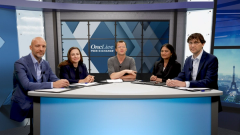
First-Line Therapy in Advanced Clear Cell RCC: Novel Triplet Regimens
Focusing on novel first-line triplet therapy combinations, panelists consider which regimens may find a role in the management of advanced clear cell RCC.
Episodes in this series

Transcript:
Thomas Powles, MD: I’m going to talk about the triplet therapy. COSMIC-313 was terrific in some respects. It was a positive trial for PFS [progression-free survival]. The response rates were quite modest, not in the 70% range, more like the 40% range. We probably wanted to see more. It has a higher response rate and a positive PFS, which is great. CR8 is at 3%, which is lower than we would have liked. It’s confusing because CR [complete response] for lenvatinib-pembrolizumab is 11% and for ipilimumab-nivolumab is 18%. Until we see that overall survival signal, it’s very hard to say you have to give that third drug. Clearly, we hope by giving everything together—as we do in testes cancer and prostate cancer—they would add to each other, and we’d get better control. We’re in a position where we need to see more. It’s a positive trial, which is great, but there’s also another study around the corner with lenvatinib-pembrolizumab as the control arm. Talk about that, Rana.
Rana McKay, MD: This trial looks at the control arm of lenvatinib-pembrolizumab, then lenvatinib-pembrolizumab plus belzutifan, and lenvatinib-pembrolizumab plus the anti-CTLA4 from Merck. It’s important to understand the role of these triplets in the context of frontline RCC [renal cell carcinoma]. At the end of the day, overall survival will end up carrying the day because it’s going to be more toxic. We see the toxicity is worse, so there has to be a justifiable reason for doing triplets. There’s rationale from winning at the short game and the long game, but do you end up sacrificing both for toxicity because you can’t get the treatment. We have to wait and see.
Thomas Powles, MD: Eric, what’s your take on this triplet? It’s in its infancy. We’ve seen the first data. For the first time, we have a positive trial. We’ve got other studies in the background.
Eric Jonasch, MD: We’ve got to see an OS [overall survival] signal in COSMIC-313, for example. We’ve got to understand the biology better. We need to do studies that help us understand. We’re piling drugs upon drugs without really knowing in whom we should be or should not be doing this and whether it has any effect. Bempegaldesleukin plus PD-1 is a very interesting example of where you’re seeing response rates, which are lower than what we’ve seeing with single-agent nivolumab. Understanding what’s happening at a micro-environmental level with these combinations before we charge ahead is critical.
Ulka Nitin Vaishampayan, MD: I’ll raise a point: are we compromising the basic immunotherapy that we’re dependent on to give us that long-term response? If we are, with the triplet, with the addition of whatever additional third agent you’re using, that could be a concern.
Thomas Powles, MD: Ulka, is your point that the triplet is inhibiting our the ability to do any of it well? Is that what you’re saying?
Ulka Nitin Vaishampayan, MD: Yes, that’s a concern.
Thomas Powles, MD: I hear that clearly. My take on it overall is that it’s an exciting area. It’s not done. The test is securing everyone. I always said I want a 25% CR. Inevitably, some people will be disappointed by these results, on the 1 hand. On the other hand, it’s a positive randomized phase 3 trial for progression, and survival is the first step in the right direction. We’d all agree that we’d love to see some OS. That’s really important before we make big changes to our treatment pathway.
Transcript edited for clarity.




































